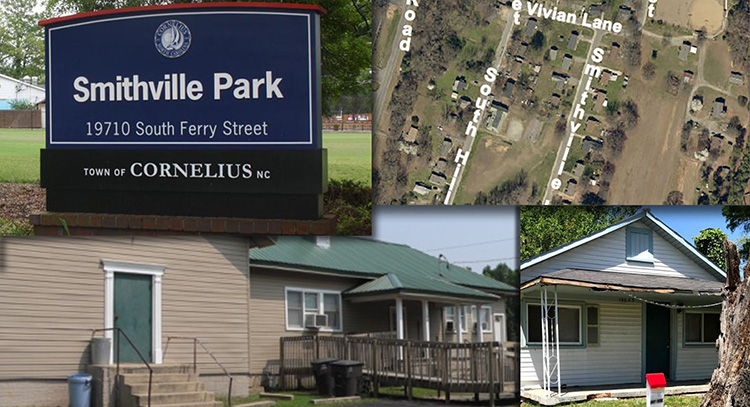
The many faces of Smithville
By Debbie Griffin. The Save Our Smithville community organization continues to push back against gentrification even as residents receive a steady flow of offers from developers and speculators.
Smithville constituents asked Mecklenburg County to allocate $3 million in its 2020 budget for the neighborhood revitalization. The county budget has $250,000 for “Smithfield Community Revitalization Consulting.”
But just how far has gentrification gone in the historically black Smithville neighborhood and is it too late to do anything about it?
Representatives of the Save Our Smithville group, an offshoot of the Smithville CommUnity Coalition, say it’s not. Coalition board member and redevelopment expert Willie Jones said the threat of gentrification is what motivates the group to work on a redevelopment plan.
Gentrification displaces residents when people or companies move in and drive up property values. In turn, they drive taxes up, sometimes so high that the people whose neighborhood it was can’t afford to live there anymore.
It’s been the demise of similar Charlotte neighborhoods, such as the one on the east side of Westfield near the Park Road Shopping Center, where older homes are torn down regularly and replaced with McMansions.
Some of the remaining homes in that neighborhood are valued at less than $200,000; newly built replacement houses are $750,000 and up.
In Smithville, some residents are senior citizens on a fixed income, with little or no room in their budgets for increased expenses.
Regarding gentrification, there aren’t any one-size-fits-all answers.
45% of lots are vacant
Jones and his coalition colleagues have developed a conceptual plan that aims to prevent displacement, control gentrification and preserve the character of the neighborhood, among other goals.
“We would have been better off starting sooner,” Jones said, adding that gentrification is here now, so it’s about finding ways to address it.
The Smithville neighborhood is just east of I-77, north and south of Catawba Avenue. The southern portion is more at risk so it is the primary target for redevelopment.
Smithville neighborhood consists of 151 total lots, about 8 percent of which are “market rentals.” Nearly 40 percent are owner-occupied homes and another 8 percent are family rentals. Around 45 percent of the lots are vacant.
Jones clarifies that the primary target area does not include the land south of Smithville Park, the community garden or the majority of homes on Smithville Lane. He explained how most of those were built in the 1970s and represent the newest homes in the old neighborhood. They’re not in danger of being torn down for new-home construction.
Conversely, most homes on South Hill Street, South Ferry Street and Vivian Lane are much older, some dating back to the first World War. Indeed, Smithville was settled by former slaves at the turn of the 20th century, and Jones said the neighborhood was historically segregated and redlined before getting annexed into the town in the 1980s.
Town owns 18%
There are approximately 50 properties in the primary redevelopment area. Nearly half of those are open lots, while about 26 percent are vacant, blighted structures.
The Town of Cornelius owns about 18 percent of the open land in the target area, but some of that includes easements where building would not be allowed. Additionally, there are three streams flowing through Smithville governed by environmental and water-quality laws.
Jones said many Smithville owners are 70 years or older, and they may share the property with children or other relatives. Many Smithville homes have been in the same family for more than a century.
Jones describes it as a process, not just going in to make an offer. Most of the residents have nowhere “affordable” to go if they do sell and leave.
The idea will be to raise funds then purchase property and eventually develop housing for people who make only 80 percent of the area median income. Fair-housing covenants would prevent property values from soaring on future housing developed for sale or rent so that the units remain affordable to seniors and working-class people.
Investors own about three acres in the primary Smithville target area, but only one of those acres is held by what Jones calls a “shadow investor.”
“The problem now is too much vacant land and too much pressure on that vacant land,” Jones said.
The plan’s intent is slow the pace of gentrification and transition the neighborhood more slowly than the open market would.
He said the approach uses a redevelopment authority model, which has been used in major cities, that tamps down costs by doing land aggregation, permitting and infrastructure “at a wholesale level.”
Jones points out that building homes on empty land will increase tax revenue, which can also help pay for parts of the plan.
Latest strides
SOS got started on an action plan using grant funds. It had a professional planner put together a conceptual plan, ordered independent assessments for all Smithville property, and it’s held small-group informational sessions for residents.
Smithville residents and advocates of SOS attended the May 9 public hearing on Mecklenburg County’s 2020 budget. Four of them spoke to commissioners and emphasized the importance of funneling funds to the northern part of the county
Jones pointed out, “Smithville is the oldest, intact African American neighborhood in North Mecklenburg.”
Coalition Board Member Lisa Mayhew Jones highlighted how the plan includes a goal to acquire and rehabilitate the Rosenwald School into a community center. She said nobody is forced to participate and the SOS has at least 70 percent of the residents’ support.
Cornelius Commissioner Denis Bilodeau said he supports the Smithville plan, and the residents need the county’s help. He suggested it would be a “feather in the county’s cap” to assist with a solution.
“Smithville is very important to Cornelius, and I don’t want to see it go away,” Bilodeau said.
In some cases, ownership of the properties settled to multiple heirs, making sales more challenging. Jones said the coalition will soon offer a “family tree” service to residents in the primary Smithville redevelopment area. The coalition has secured a pro-bono attorney and title company, as well as interns from Davidson College and volunteers to help the interns.
That group will work with residents who have heir properties to locate all the relevant property owners. Some cases involve one missing heir, while others include many.
Next steps, said Jones, are to talk with the Town of Cornelius about a land-use plan, continue talking with residents and begin some surveying.
He said, “Ultimately, it’s about the quality of life and the ability to have a diverse neighborhood.”





